| Cookie | Duration | Description |
|---|---|---|
| cookielawinfo-checkbox-analytics | 11 months | This cookie is set by GDPR Cookie Consent plugin. The cookie is used to store the user consent for the cookies in the category "Analytics". |
| cookielawinfo-checkbox-functional | 11 months | The cookie is set by GDPR cookie consent to record the user consent for the cookies in the category "Functional". |
| cookielawinfo-checkbox-necessary | 11 months | This cookie is set by GDPR Cookie Consent plugin. The cookies is used to store the user consent for the cookies in the category "Necessary". |
| cookielawinfo-checkbox-others | 11 months | This cookie is set by GDPR Cookie Consent plugin. The cookie is used to store the user consent for the cookies in the category "Other. |
| cookielawinfo-checkbox-performance | 11 months | This cookie is set by GDPR Cookie Consent plugin. The cookie is used to store the user consent for the cookies in the category "Performance". |
| viewed_cookie_policy | 11 months | The cookie is set by the GDPR Cookie Consent plugin and is used to store whether or not user has consented to the use of cookies. It does not store any personal data. |

graduated from Chemistry department (University of Athens, 1984) and he obtained a M.Sc. (1985) and then a PhD (1989) from University Paris VII (France) in Atmospheric Sciences. He was elected as Assistant Professor at the University of Crete (1993). In 1999 he was promoted to the rank of Associate Professor and in 2003 as Full Professor in Environmental Chemistry. Since 2013 he is Director of the Institute for Environmental Research and Sustainable Development (IERSD) of the National Observatory of Athens (NOA). His expertise is in the field of Atmospheric chemistry and physics, Global biogeochemical cycles and Environmental Analytical chemistry. He has participated in more than 45 research programs (in 30 as coordinator) funded by European and National agencies and acted as a member of the Organizing and Scientific Committee in 15 National and International Conferences. He has published more than 270 original papers in peer reviewed scientific journals and more than 600 papers in international conferences (more than 11500 citations, h-index = 58). Currently he is the vice president of the Hellenic Association for Aerosol Research.
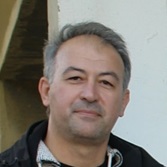
is Research Director at NCSR Demokritos, Head of the Aerosol Group. Research expertise on Physicochemical aerosol characterization and nuclear analytical techniques for climatic active aerosol species, nano-particle metrology, development of novel sampling and measurement techniques for aerosol particles, exposure of humans to aerosol contaminants such as heavy metals and radioactive pollutants, and retrieval of emission source impact, source apportionment and receptor modelling. PI for Demokritos in several EU FP and DG-ENV programmes, IAEA Regional projects & other National programmes. Established infrastructure, including the Athens GAW/ACTRIS Demokritos station, the Mt. Helmos Free troposphere Aerosol and GHG station and the QA/QC aerosol lab facility (EN 17025 accredited). National Counterpart for Greece in Regional IAEA programmes. He has supervised 12 PhD theses and 14 MSc project theses. He has more than 145 articles in peer-reviewed journals. Invited reviewer and project evaluator (EURAMET European Metrology Research, the Czech & Hungarian Academy of Sciences Grant programmes). Invited IAEA expert missions (3) Africa and Middle East, Member of the National Emergency Action Plan “Xenokratis”. Founding member and president of the Hellenic Association for Aerosol Research.
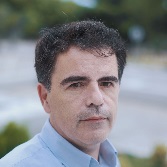
is Professor in the Chemical Engineering Department of the University of Patras in Greece and Director of the Laboratory of Air Quality Studies (LAQS) in the Institute of Chemical Engineering Sciences of FORTH. He received his PhD from the California Institute of Technology in 1991 and joined the faculty of Carnegie Mellon University in 1993 and of the University of Patras in 2004. His research includes theoretical and experimental studies of atmospheric chemistry as it relates to urban and regional pollution and topics related to global climate change. He is one of the most cited researchers in Geosciences. He has been awarded the Ken Whitby Award by the American Association for Aerosol Research, the CAREER award by the US National Science Foundation, the Book of the Year Award by the American Meteorological Society, the Vaughn Lectureship by Caltech, the Sinclair Award by the American Association for Aerosol Research, the Cecil Award for excellence in environmental engineering research by the American Institute of Chemical Engineering, the Lacey Lectureship by Caltech, an ERC Senior Investigator award and the Vilhelm Bjerknes Medal by the European Geophysical Union. He has been the recipient of the Elias Chair in Carnegie Mellon University, the Kun Li award for Excellence in Chemical Engineering education, and the Benjamin Teare award for Excellence in Engineering education. He is the ex-president of the American Association for Aerosol Research.

received his Bachelor degree in 1995 from the National Technical University of Athens-Greece (Dept. of Mechanical Engineering), a Master of Science in 1999, a Ph.D. in 2002 from the University of Minnesota (Dept. of Aerospace Engineering and Mechanics, Minneapolis, MN) and an MBA with focus on management in 2018 (St. Thomas University, MN). Stamatios Pothos joined TSI Incorporated (www.tsi.com, Shoreview, Minnesota) in October of 2001 and he is currently the Director of Sales for the Americas. His research interests span over a wide range of applications within the areas of Fluid Mechanics and Particle Technology and he has been specialized in the area of optical flow diagnostics by means of both intrusive and non-intrusive experimental techniques. Stamatios Pothos served as the Vice Chair (2016-2018) and Chair (2018-2020) of the FMITC (Fluids Measurement Instrumentation Technical Committee) at ASME and he is active member of ASME, APS and AAAR.
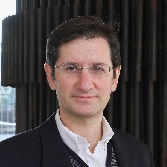
is a Professor of Atmospheric Processes and heads the Laboratory of Atmospheric Processes and their Impacts (LAPI) at the École Polytechnique Fédérale de Lausanne, Switzerland. He is an affiliate researcher of the Institute of Chemical Engineering Science at FORTH and a founding member of the Center of Studies on Air quality and Climate Change at the institute. His research focuses on the impact of atmospheric processes (especially aerosol) on clouds, climate, air quality and ecosystems. He is the prime author of the ISORROPIA aerosol thermodynamics models, aerosol-cloud parameterization modules and developer of instrumentation to measure aerosol properties and Cloud Condensation Nuclei. A Web of Science Highly Cited Researcher (2020), having authored/co-authored more than 300 manuscripts (Google Scholar citations > 26800, h=89). He serves as President of Atmospheric Sciences of the European Geophysical Union, and member of the UN Joint Group of Experts on the Scientific Aspects of Marine Environmental Protection (WG38: Atmospheric input of chemicals to the ocean), the Committee on Nucleation and Atmospheric Aerosols, and served on the Swiss Geosciences Roadmap (2020-2021), US National Academies Committee on the Future of Atmospheric Chemistry Research (2014-2016), Secretary of Atmospheric Sciences of the American Geophysical Union (2012-2016), Board of Directors of the American Association for Aerosol Research (2014-2017) and Editor in the Copernicus journal Atmospheric Chemistry and Physics (2004-2019). He is a member of the Academia Europaea (2021), an American Geophysical Union Fellow (2020); recipient of a ERC Consolidator Grant (2016); Vaughan Lectureship, California Institute of Technology (2014); Ascent Award, American Geophysical Union (2012); Whitby Award, American Association for Aerosol Research (2011); Houghton Award, American Meteorological Society (2009); Sigma Xi Young Faculty Award (2007); Friedlander Award, American Association for Aerosol Research (2005); NASA New Investigator Award (2004) and a National Science Foundation CAREER Award (2004).
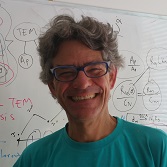
is a Senior Research Scientist at the European Commission’s Joint Research Centre. His research activities explore aspects of theoretical aerosol physics, including particle formation and transport in laminar and turbulent flows, thermophoretic transport, homogeneous and heterogeneous nucleation, and statics (morphology) and dynamics (agglomeration and fragmentation) of fractal-like agglomerates. He has also studied the transmission dynamics of respiratory viruses, and more recently he has developed epidemiological models for the transmission dynamics of SARS-CoV-2. He studied chemistry at Yale University (BSc), mathematics at Columbia University (MSc), and completed his doctoral degree in chemical physics at Harvard University. He was a Visiting Professor at the School of Mechanical and Systems Engineering, Newcastle University (2004-2010), an Honorary Research Associate of the Department of Physics and Astronomy, University College London (2014-2019), and a Visiting Researcher at the Department of Mechanical Engineering, University of Minnesota, Minneapolis (fall 2018). He chaired the Fundamentals Working Group of the European Aerosol Assembly (2012 – 2017) and he has been a member of the scientific committee of numerous European Aerosol Conferences. He is a founding member of HAAR. He currently serves as an Editor for Aerosol Science and Technology.

is an Affiliated Researcher at the Centre for Research and Technology Hellas in Thessaloniki. She studied Physics at the Aristotle University of Thessaloniki (2004) and holds a MSc in Microsystems and Nanostructures from National Technical University of Athens and a PhD in Mechanical Engineering from University of W. Macedonia, Kozani (2013). Her research activities focus on the synthesis of nanostructured particles via aerosol routes for energy, environmental and toxicological applications, with expertise in catalytic materials for particulate and gas treatment from Diesel engines, Li-ion batteries and toxicity assessment of nanoparticles in living systems. She is the treasurer of Hellenic Association of Aerosol Research since 2014.

is a Chemical Engineer (Dipl. ChE – Aristotle University of Thessaloniki, 2009) and holds a PhD in experimental and numerical studies of soot aggregates dynamics and structure (Aristotle University of Thessaloniki, 2015). His research activities are related to light and heavy duty vehicles particle emissions measurement, ultrafine particles sampling/condition-ning/measurement devices development and evaluation, particle number measurements in the new periodical technical inspection, and aerosol dynamics simulation. Currently, he is a researcher at the Joint Research Centre (Ispra, Italy). He has been a member of the Hellenic Association for Aerosol Research since 2011. He is a member of HAAR Board.

is a Chemical Engineer (Dipl. ChE-Aristotle University of Thessaloniki) and holds a PhD in health effects of nanoparticles (Aristotle University of Thessaloniki). In addition to being responsible for the financial and administrative supervision of research projects carried out at CPERI/CERTH, she is involved in research projects on measurement and characterisation of nanoparticles and the assessment of their biological effects on cell lines. She has been a founding member of the Board of Directors of the Hellenic Association for Aerosol Research (HAAR) and since 2019 she serves as the General Secretariat of HAAR.

(www.ptl.ethz.ch) teaches Mass Transfer and Micro-Nano-Particle Technology at ETH Zurich, Switzerland. He has graduated 44 PhDs, now at leading positions in industry and academia across the globe while currently he advises four PhDs and four post-docs. He and his students have published 400+ articles, filed 20+ patents that are licensed to industry and have contributed to the creation of five spinoffs. One of them (HeiQ) joined the London Stock Exchange in December 2020. They pioneered aerosol synthesis of several sophisticated nanomaterials with closely controlled characteristics, from perfect spheres to ramified agglomerates, by flame spray pyrolysis that is practiced today in industrial units and academic laboratories worldwide. They proved the rapid and nearly simultaneous attainment of both self-preserving size distribution and fractal-like structure during aerosol synthesis of materials enabling optimal aerosol process design for manufacture of particles and deposition of films. This led to revealing the origin of nanosilver toxicity, to novel heterogeneous catalysts and, for the first time, to aerosol-made dental and theranostic materials, nutritional supplements, and to the assembly of highly selective sensors for acetone, methanol & formaldehyde.
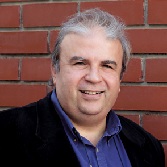
has been active since 1985 in the field of Green Mobility and Sustainable Energy researching automotive emission control (Diploma in Mech. Eng., Aristotle University, Thessaloniki, Greece; MSc. Mech. Eng., Michigan Tech Houghton, Michigan, USA) and aerosol and particle technology with applications in clean energy, environment and materials (MSc Chem. Eng., MPhil, PhD, Yale University, New Haven, Connecticut, USA). He is a specialist in nanoparticles and combustion aerosols, with extensive research and engineering consulting experience in the design, modeling and testing of structured reactors for many uses, including emission control for mobile and stationary sources, solar fuel production (renewable hydrogen and carbon-neutral hydrocarbons), and biotechnological applications. In 1996 he established in Thessaloniki, Greece, the Aerosol and Particle Technology Laboratory (APTL), today internationally acclaimed as a center of excellence, as a business unit of the Chemical Process & Energy Resources Institute (CPERI), at the Centre for Research and Technology-Hellas (CERTH). Dr. Konstandopoulos has coordinated and managed numerous research projects, funded by the European Commission and leading international industries. He is the recipient of the 2006 European Descartes Prize, the 2010 European Research Council Advanced Grant, a Fellow of the Society of Automotive Engineers and author of numerous widely cited publications. He is a founding member of HAAR and served as the first HAAR president.

holds a Chemical Engineering Diploma from the National Technical University of Athens (2000), an MSc in Environmental Engineering from Johns Hopkins University, USA (2002) and a PhD in Air pollution from the National Technical University of Athens (2008). Currently she is Assistant Researcher (Researcher C) at the Institute of Nuclear & Radiological Sciences and Technology, Energy & Safety, NCSR “Demokritos”. Her research activities focus on aerosol pollution, including ambient and indoor air quality, source apportionment and population and occupational risk assessment. She has been also actively involved in European initiatives for the development of standard methods for aerosol characterization, such as the quantification of carbonaceous species in PM and the adoption of a European harmonized methodology in the application of receptor models for PM source apportionment. She is a member of HAAR Board.

holds a BSc in Environmental Science (University of the Aegean, Greece), an MSc in Environmental Engineering (Imperial College, London), and a PhD (Cambridge University) in Engineering. He has been a postdoctoral researcher at Harvard University (USA) and has held faculty positions at the University of the Aegean (Greece), and at Delft University of Technology (the Netherlands). Currently he is an Associate Professor at the Cyprus Institute (Cyprus). George’s research activities fall in the broader field of aerosol science and technology with focus on: 1. aerosol instrumentation, 2. atmospheric aerosols, and 3. aerosol-based nanotechnology. His research has contributed a number of aerosol instruments that are now common practice for measuring the size and concentration of aerosol particles, while his latest activities focus on further understanding and improving their performance and/or reducing their size and cost, thereby becoming more versatile and attractive to use in various application. He is a member of HAAR Board.
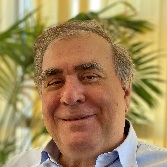
is Mechanical Engineer (National Technical University of Athens) and holds a DEA and a PhD in Mechanics (Institut National Polytechnique de Grenoble, France). He has an extensive experience of more than 25 years in research and project management in the areas of aerosol flows, nuclear engineering, scientific computing, transport phenomena, biofluid mechanics and multiphase systems. He has worked at European Commission’s Joint Research Centre-Euratom for 7 years, the French CEA (Commissariat à l’Energie Atomique) for 4 years, and at the high-tech R&D company Innovations Thermiques (France) for 1 year. Currently he is Research Director at “Demokritos” National Centre for Scientific Research, where is Head of the Thermal-Hydraulics & Multiphase Flow Laboratory (THEMLAB). Since 2008 he is Chairman of the Greek Atomic Energy Commission (EEAE), which is the national regulatory authority for radiation safety. He has published more than 150 papers in peer-reviewed journals and international conferences. He has written the standard text on aerosols in the CRC Press Handbook of Multiphase Flows (2006 & 2016), and is among the principal authors of the textbook on Light Water Reactor Severe Accident Safety (2012). Dr Housiadas has been awarded an honorable distinction by the Greek Scholarship Foundation (IKY) and a fellowship by the European Commission for graduate studies. Also, he has expert consulting activities and significant involvement in R&D policy making, technical-scientific and evaluation committees both at national and international level. During the Greek Presidency of the EU Council in 2014 Dr. Housiadas had assumed the Presidency of the relevant Council working group (WPAQ-Working Party on Atomic Questions), which reached an important agreement on the revised European Nuclear Safety Directive (Directive 2014/87/Euratom). He was designated, unanimously for 2 consecutive terms (2015-2018) Vice-Chairman of the European Nuclear Safety Regulators Group (ENSREG) and Chairman of the Working Group “Transparency” of ENSREG.
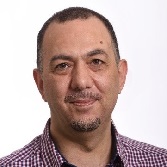
(VA) was born in Göteborg, Sweden, in 1971. He received his B.Sc. in Physics, M.Sc. in Environmental Sciences and Ph.D. in Atmospheric Physics at the Aristotle University of Thessaloniki, Greece in 1998, 2000 and 2006, respectively. VA is a Research Director at the Institute for Astronomy, Astrophysics, Space Applications and Remote Sensing (IAASARS) of the National Observatory of Athens (NOA) in Greece. He is working on climate research and he focuses on the impact of atmospheric aerosols on radiation, clouds and extreme weather. His research is mainly based on advanced ground-based and space-borne remote sensing (passive and active techniques) and theoretical models.
VA has participated in 42 research projects and experimental campaigns, in 15 of which as coordinator and 7 as Principal Investigator for NOA. He has more than 100 publications in peer-reviewed scientific journals and his work received 3500 citations from third-party (h-index = 37, source: ISI Web of Knowledge). Moreover, VA participated in numerous conferences, co-chaired 8 of them and invited to present his work 11 times. VA is leading the Atmospheric Remote Sensing group in IAASARS/NOA, currently composed of 25 members (9 Postdocs, 11 PhDs and 5 support staff). He is a member of the editorial board of EGU’s Atmospheric Measurement Techniques Journal (Copernicus Publications, Impact Factor = 3.2) and he is active reviewer in ~25 scientific Journals in his field. VA is responsible for the operation and data exploitation of the 24/7 PollyXT sophisticated lidar system, part of the European Aerosol Research Lidar Network (EARLINET). He is also the PI of the Remote Sensing National Facilities of IAASARS/NOA at the island of Antikythera and the recently established PANGEA Observatory, and he is in charge of the operations for the Cal/Val program of ESA for ADM-Aeolus and EarthCARE in Greece, employing the official ESA ground-based mobile lidar system which is under development by IAASARS/NOA and Raymetrics S.A. (EVE).
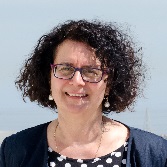
is Professor of Computational Environmental Chemistry (since 2008) and Director of the Environmental Chemical Processes Laboratory (ECPL) of the Department of Chemistry of the University of Crete, holds an Excellence Chair at the Institute of Environmental Physics of the University of Bremen (2020-2023) and is also a visiting faculty member at the Institute of Chemical Engineering Sciences of the Foundation for Research and Technology Hellas, Patras. She holds a B.Sc. in Chemistry (1984) from the University of Athens, Greece, a MSc in Chemistry of Pollution (1985), a PhD in Chemistry of Air Pollution and Environmental Physics (1988) and a Habilitation in Chemistry (1993), all three from the University of Paris 7, France. Her scientific interests focus on human-driven changes and feedbacks on atmospheric chemistry and physics, biogeochemical cycles and interactions with climate. She is most known for her global modeling studies of organics and recently on nutrients (nitrogen, iron and phosphorus) atmospheric deposition to the ocean. She is recipient of the EGU 2016 Vilhelm Bjerknes Medal for Atmospheric Sciences, a von Humboldt award (2019), the H. Julian Allen Award 1998, and honorary member of International Commission on Atmospheric Chemistry and Global Pollution (IGACGP) of the IAMAS/ICSU.
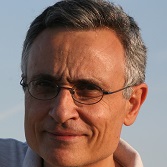
is the Director of the Laboratory of Optoelectronics, Lasers and Applications and Research Professor of Physics, Lasers and Laser Remote Sensing, at the National Technical University of Athens (NTUA). He has received the Diploma of Electrical Engineering from NTUA (1984), then the DEA (M.Sc.) in Physical Methods of Remote Sensing from Université Paris 7 (France) on 1985, and, finally, the Ph.D. in Laser Remote Sensing of the Atmosphere, from Université Paris 7 (France) on 1989. He has more than 35 years of experience in designing, developing and applying the technique of the laser remote sensing of the atmosphere, to measure the vertical profiles of ozone and water vapour, as well as the optical properties of aerosols in the troposphere and the lower stratosphere. AP is working on the monitoring of the optical properties of aerosols since 2000 and on their role on climate change and cloud formation near the Planetary Boundary Layer (PBL), in combination with sun photometry and satellite data.
AP has participated in more than 65 research projects funded by the European Union, the European Space Agency, and Greek National Organisations, with a total budget of ~3.5 M€. He is founding member of the European lidar Network (EARLINET) and member (2008-2015) and President (2015-2022) of the International Coordination Group on Laser Atmospheric Studies (ICLAS). He has served as Member of the Scientific Committee and Co-chair of more than 25 International Conferences, related to lidar atmospheric/meteorological applications. He co-organized the 26th International Laser Radar Conference, June 2012, Porto Heli, Greece. He has published >132 papers in peer-reviewed journals, 6 Book chapters and 250 papers in International Conferences Proceedings. He has received more than 7.800 citations (h-index 47) for his peer-reviewed papers in Google Scholar. He has supervised more 15 Ph.D. students at NTUA and 60 M.Sc. Diploma Theses.
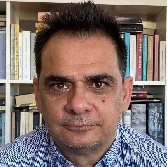
received his BSc in Physics in 1989 and his PhD in Atmospheric Physics in 1998 from the Aristotle University of Thessaloniki, Greece. He has been elected as Lecturer at AUTH’s Physics Department in 2000 and is currently serving as full Professor at the same Department. Since 2000 he has been teaching courses in various topics related to Atmospheric Physics in the undergraduate program of the Physics Department of AUTH as well as the Graduate Program of Environmental Physics of AUTH. He has been involved in Atmospheric Science research for more than 25 years. His research activities are focused on the study of the aerosol and cloud properties using the lidar technique and in the validation of satellite products of atmospheric trace gases. He has been elected member of the International Ozone Commission and currently member of ICLAS and was national representative in the GMES Advisory Board until 2008. He has participated as principal investigator in several national and European projects funded by EU, ESA and EUMETSAT. He has published more than 160 papers in peer review journals during the period 1993-2021, most of them published in journals with high impact factors like JGR, ACP, AMT, GRL and Atmospheric Environment with more than 4000 citations. In addition he has 6 publications as chapters in books, approximately 250 publications-presentations in international conferences and around 40 publications in national conferences.
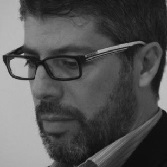
(born in 1974) is a Research Director at the Institute for Environmental Research and Sustainable Development of the National Observatory of Athens (NOA). He studied Physics at the Aristotle University of Thessaloniki and has a PhD in the field of Atmospheric Physics and Dynamics. He has worked as Post Doctoral fellow at the Max Planck Institute (Biogeochemistry Department, Mainz-DE) and the University of Crete (Chemistry Department, ECPL). His research interests include air quality, aerosol research, climate change and relevant synergistic interactions. He is leading the Atmospheric Physics and Chemistry Group of NOA and he is Head and Quality Assurance Manager of the Laboratory of Atmospheric Chemistry. He is the Director of the Greek GEO Office, represents Greece in the relevant international bodies (i.e. GEO Programme Board/UN, EuroGEOSS Coordination Group/EC), and he is Member of the Board of the Hellenic Quality Assurance & Accreditation Agency (HQA).
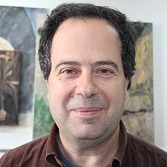
received his PhD at the University of Helsinki and he performed his post-doctoral work at the Joint Research Centre at Ispra (Italy) and at Rutgers University (USA) s. He also worked at the Harvard School of Public Health and at the Technical Research Centre of Finland (VTT). During 1998 – 2000 he was a senior researcher at the Norwegian Institute of Air Pollution (NILU) in Norway. He is currently a Professor at the School of Chemical and Environmental Engineering, Technical University of Crete, Greece working in the area of air pollution, indoor air quality and human exposure and health. He has an extensive research management experience with several EU and National research projects including research contracts from the Industry. Prof. Lazaridis has an extensive work experience in modelling of physico-chemical processes in the atmosphere, modelling of human exposure and dose from air pollutants, indoor air quality and measurements of air pollutants. He has a strong publication record including 6 books, 128 research articles in refereed journals and more than 280 presentations in international conferences.